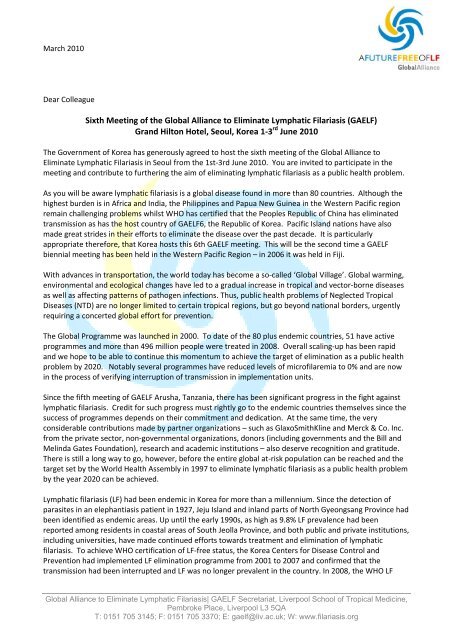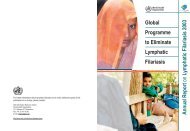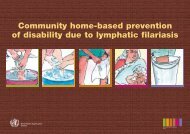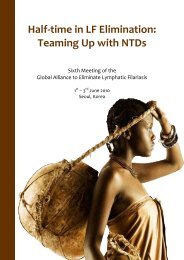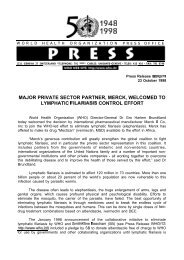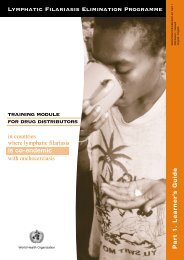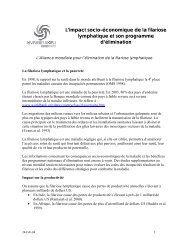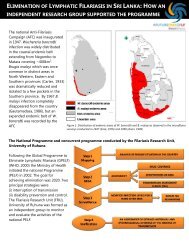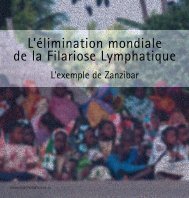Invitation Letter - Global Alliance to Eliminate Lymphatic Filariasis
Invitation Letter - Global Alliance to Eliminate Lymphatic Filariasis
Invitation Letter - Global Alliance to Eliminate Lymphatic Filariasis
You also want an ePaper? Increase the reach of your titles
YUMPU automatically turns print PDFs into web optimized ePapers that Google loves.
March 2010<br />
Dear Colleague<br />
Sixth Meeting of the <strong>Global</strong> <strong>Alliance</strong> <strong>to</strong> <strong>Eliminate</strong> <strong>Lymphatic</strong> <strong>Filariasis</strong> (GAELF)<br />
Grand Hil<strong>to</strong>n Hotel, Seoul, Korea 1-3 rd June 2010<br />
The Government of Korea has generously agreed <strong>to</strong> host the sixth meeting of the <strong>Global</strong> <strong>Alliance</strong> <strong>to</strong><br />
<strong>Eliminate</strong> <strong>Lymphatic</strong> <strong>Filariasis</strong> in Seoul from the 1st-3rd June 2010. You are invited <strong>to</strong> participate in the<br />
meeting and contribute <strong>to</strong> furthering the aim of eliminating lymphatic filariasis as a public health problem.<br />
As you will be aware lymphatic filariasis is a global disease found in more than 80 countries. Although the<br />
highest burden is in Africa and India, the Philippines and Papua New Guinea in the Western Pacific region<br />
remain challenging problems whilst WHO has certified that the Peoples Republic of China has eliminated<br />
transmission as has the host country of GAELF6, the Republic of Korea. Pacific Island nations have also<br />
made great strides in their efforts <strong>to</strong> eliminate the disease over the past decade. It is particularly<br />
appropriate therefore, that Korea hosts this 6th GAELF meeting. This will be the second time a GAELF<br />
biennial meeting has been held in the Western Pacific Region – in 2006 it was held in Fiji.<br />
With advances in transportation, the world <strong>to</strong>day has become a so-called ‘<strong>Global</strong> Village’. <strong>Global</strong> warming,<br />
environmental and ecological changes have led <strong>to</strong> a gradual increase in tropical and vec<strong>to</strong>r-borne diseases<br />
as well as affecting patterns of pathogen infections. Thus, public health problems of Neglected Tropical<br />
Diseases (NTD) are no longer limited <strong>to</strong> certain tropical regions, but go beyond national borders, urgently<br />
requiring a concerted global effort for prevention.<br />
The <strong>Global</strong> Programme was launched in 2000. To date of the 80 plus endemic countries, 51 have active<br />
programmes and more than 496 million people were treated in 2008. Overall scaling-up has been rapid<br />
and we hope <strong>to</strong> be able <strong>to</strong> continue this momentum <strong>to</strong> achieve the target of elimination as a public health<br />
problem by 2020. Notably several programmes have reduced levels of microfilaremia <strong>to</strong> 0% and are now<br />
in the process of verifying interruption of transmission in implementation units.<br />
Since the fifth meeting of GAELF Arusha, Tanzania, there has been significant progress in the fight against<br />
lymphatic filariasis. Credit for such progress must rightly go <strong>to</strong> the endemic countries themselves since the<br />
success of programmes depends on their commitment and dedication. At the same time, the very<br />
considerable contributions made by partner organizations – such as GlaxoSmithKline and Merck & Co. Inc.<br />
from the private sec<strong>to</strong>r, non-governmental organizations, donors (including governments and the Bill and<br />
Melinda Gates Foundation), research and academic institutions – also deserve recognition and gratitude.<br />
There is still a long way <strong>to</strong> go, however, before the entire global at-risk population can be reached and the<br />
target set by the World Health Assembly in 1997 <strong>to</strong> eliminate lymphatic filariasis as a public health problem<br />
by the year 2020 can be achieved.<br />
<strong>Lymphatic</strong> filariasis (LF) had been endemic in Korea for more than a millennium. Since the detection of<br />
parasites in an elephantiasis patient in 1927, Jeju Island and inland parts of North Gyeongsang Province had<br />
been identified as endemic areas. Up until the early 1990s, as high as 9.8% LF prevalence had been<br />
reported among residents in coastal areas of South Jeolla Province, and both public and private institutions,<br />
including universities, have made continued efforts <strong>to</strong>wards treatment and elimination of lymphatic<br />
filariasis. To achieve WHO certification of LF-free status, the Korea Centers for Disease Control and<br />
Prevention had implemented LF elimination programme from 2001 <strong>to</strong> 2007 and confirmed that the<br />
transmission had been interrupted and LF was no longer prevalent in the country. In 2008, the WHO LF<br />
<strong>Global</strong> <strong>Alliance</strong> <strong>to</strong> <strong>Eliminate</strong> <strong>Lymphatic</strong> <strong>Filariasis</strong>| GAELF Secretariat, Liverpool School of Tropical Medicine,<br />
Pembroke Place, Liverpool L3 5QA<br />
T: 0151 705 3145; F: 0151 705 3370; E: gaelf@liv.ac.uk; W: www.filariasis.org
Elimination Certification Committee certified elimination status of Korea, which holds great significance as<br />
the first parasitic disease <strong>to</strong> be eliminated in Korea.<br />
In commemoration of obtaining WHO certification for LF elimination, Korea will host the 6th Meeting of the<br />
<strong>Global</strong> <strong>Alliance</strong> <strong>to</strong> <strong>Eliminate</strong> <strong>Lymphatic</strong> <strong>Filariasis</strong> (GAELF) at the Grand Hil<strong>to</strong>n Hotel, Seoul<br />
(http://www.hil<strong>to</strong>n.co.uk/HiWayWeb/seo/grandseoul?WT.srch=1). This meeting is expected <strong>to</strong> serve as an<br />
opportunity <strong>to</strong> further accelerate the global effort for LF elimination as well as relevant research studies.<br />
The theme of the meeting is ‘Half time in LF elimination: Teaming up with NTDs’ and will focus on strategic<br />
issues with the outcomes and recommendations from discussions providing a platform for the next decade<br />
in an environment where global health will remain high on the development agenda. The working<br />
languages of the meeting will be English and French.<br />
Regrettably, the <strong>Global</strong> <strong>Alliance</strong> is unable <strong>to</strong> provide financial support for your participation. We sincerely<br />
hope, however, that this does not preclude your attendance.<br />
The registration form can be accessed at http://www.filariasis.org/events/registration_form.html<br />
and additional information at http://www.filariasis.org/events/general_info.html<br />
We hope that you will be able <strong>to</strong> attend the meeting and look forward <strong>to</strong> receiving your completed<br />
registration form.<br />
Yours sincerely<br />
Jong-Koo Lee, MD, Ph.D<br />
Direc<strong>to</strong>r<br />
Centers for Disease Control and Prevention<br />
Ministry of Health and Welfare<br />
Republic of Korea<br />
Professor David H. Molyneux<br />
Executive Secretary, Executive Group<br />
<strong>Global</strong> <strong>Alliance</strong> <strong>to</strong> <strong>Eliminate</strong> <strong>Lymphatic</strong> <strong>Filariasis</strong><br />
FURTHER INFORMATION<br />
Should you require any further information regarding the meeting please contact the Secretariat, <strong>Global</strong><br />
<strong>Alliance</strong> <strong>to</strong> <strong>Eliminate</strong> <strong>Lymphatic</strong> <strong>Filariasis</strong>.<br />
Tel. 44 151 705 3145; Fax 44 151 705 3370; email gaelf@liv.ac.uk<br />
The sixth meeting of the <strong>Global</strong> <strong>Alliance</strong> <strong>to</strong> <strong>Eliminate</strong> <strong>Lymphatic</strong> <strong>Filariasis</strong> is supported with funding from:<br />
Ministry for Health, Welfare and Family Affairs National Institute of Health, Korea<br />
GlaxoSmithKline<br />
Merck & Co. Inc./Mectizan Donation Program<br />
<strong>Global</strong> <strong>Alliance</strong> <strong>to</strong> <strong>Eliminate</strong> <strong>Lymphatic</strong> <strong>Filariasis</strong>| GAELF Secretariat, Liverpool School of Tropical Medicine,<br />
Pembroke Place, Liverpool L3 5QA<br />
T: 0151 705 3145; F: 0151 705 3370; E: gaelf@liv.ac.uk; W: www.filariasis.org


